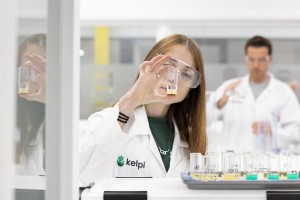Kelpi, the Bath-founded biotech company developing innovative bioplastic food packaging from seaweed, has secured a £4.35m investment to take it to market.
The funding round, which includes further finance from a group of West of England investors who previously backed the firm, will enable the firm to expand its operations, grow its team and run scale-up pilots to plot its pathway to launch. 
Kelpi, co-founded by Prof Chris Chuck from the University of Bath’s Department of Chemical Engineering and originally a member of the university-backed SETsquared Scale-Up Programme, invented the unique compostable material to replace single-use fossil fuel plastics, which take hundreds of years to decompose.
Its biomaterial is unique in matching – or even exceeding – the performance of plastic, in particular as strong water barrier and with resistance to greasy contents or acidic foods.
The equity funding round was led by Gloucester-based innovation investors Blackfinch Ventures, with funding from Green Angel Ventures, science and tech investor Kadmos Capital, Evenlode Foundation, the South West Investment Fund and QantX, the South West-focused venture capital firm investing in globally impactful innovations across sectors improving outcomes in health and sustainability.
The round also included follow-on investment from Bristol Private Equity Club (BPEC), the network of West of England-based entrepreneurs, London-based One Planet Capital and private angel investors. 
The funds will be used to advance Kelpi’s manufacturing pilots and gain regulatory approval for its proprietary coatings for paper and card as well as continuing the commercial roll-out which has already led to contracts with global leaders such as L’Oréal and Diageo and Waitrose for its tropical fresh fruit supplier Blue Skies.
Kelpi CEO Neil Morris described as the investment as a huge step forward for the business which would enable it to scale up its pioneering work and take world-leading packaging material to market.
“Kelpi can now play a key role in ending our dependence on fossil fuels to create single-use packaging and so eliminating a major source of plastic pollution,” he added.
“We’re delighted to receive this backing from investors like Blackfinch and Green Angel Ventures to allow us to accelerate our pioneering work.” 
Blackfinch head of ventures Dr Reuben Wilcock said Kelpi stood out as a strong combination of world-leading scientific innovation with extensive entrepreneurial experience.
“Their technology has immense commercial potential and we’re excited to be backing the company to scale up and go to market,” he added.
Green Angel Ventures CEO Cam Ross said: “We’ve been consistently impressed with Kelpi’s team and technology, and their pioneering approach to developing biopolymers from renewable feedstocks like seaweed.
“At scale, the Kelpi approach will play a vital role in reducing fossil fuel dependency, addressing climate change and impacting on plastic pollution.”
Kelpi, now based in the Science Creates incubator in Bristol, uses only seaweed that has been farmed sustainably, ensuring a positive impact on the environment as seaweed sequesters huge amounts of carbon dioxide as it grows, deacidifying the ocean and providing a rich environment for fish.
Seaweed provides a particularly valuable source of carbohydrates for biomaterials. It grows prolifically without need for fertilisers, land or fresh water – offering benefits over alternative plants from which bioplastics can be made. It also soaks up carbon as it grows, de-acidifying and re-oxygenating the ocean.
Just 9% of all the plastic waste ever produced has been recycled. Some 12% has been incinerated and the remaining 79% dumped in landfills or remained above ground to pollute the environment.
Despite this, more than 99% of plastics are still produced from chemicals derived from oil, natural gas and coal.
According to the United Nations Environment Programme, by 2050 the plastic industry could account for 20% of the world’s total oil consumption if current trends continue.




















